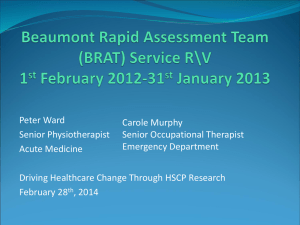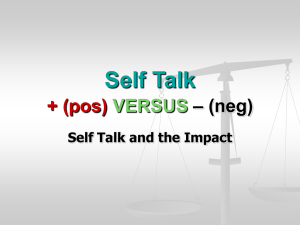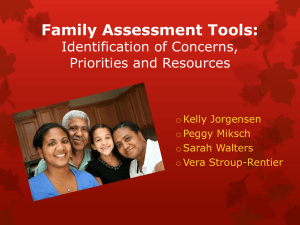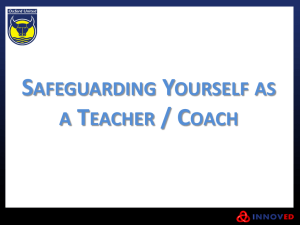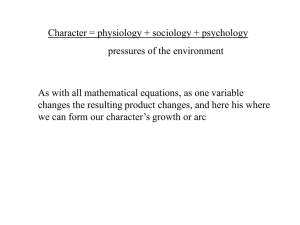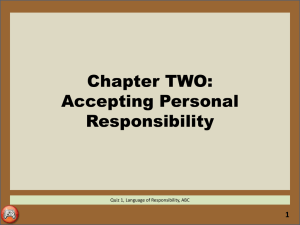Challenge - Values Coach Inc.
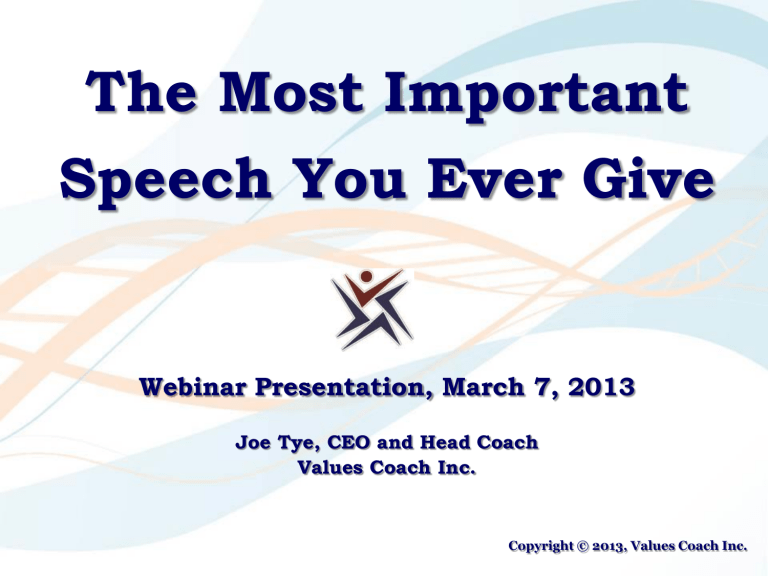
The Most Important
Speech You Ever Give
Webinar Presentation, March 7, 2013
Joe Tye, CEO and Head Coach
Values Coach Inc.
Copyright © 2013, Values Coach Inc.
If you have questions that I did not address in this webinar, send me an email and I’ll respond: joe@joetye.com
2
Today we are talking about you personally, but the collective self-talk of your organization forms an invisible ceiling on your potential performance.
3
You might have taken a class on public speaking or joined
Toastmasters but…
But you have probably never taken a class on how to give the most important speech you ever give…
The one you give to yourself all day every day.
Learning how to talk to yourself in a positive, constructive, and empowering way is not so much about telling yourself happy little lies as much as it is preventing yourself from falling victim to depressing big lies.
“Our beliefs about ourselves and the nature of our abilities [our self-theories] determine how we interpret our experiences and can set the boundaries on what we accomplish.”
Daniel Pink: Drive
“I used to think my brain was my most important organ. But then I thought: wait a minute, who’s telling me that?”
Emo Phillips, quoted in Sandra Aamodt and Sam Wang:
Welcome to Your Brain: Why You Lose Your Car Keys but Never Forget How to Drive and Other Puzzles of
Everyday Life
The Bad
News
Your Inner Child is shadowed by an
Inner Spoiled Brat
For a variety of evolutionary reasons, the human mind automatically gravitates toward negative, frightening and depressing thoughts.
Mihaly Csikszentmihalyi: The Evolving Self: A
Psychology for the New Millennium
Experts refer to ANTs – automatic negative thoughts
Psychologists say that up to
80% of self-talk is negative – and that we can abuse ourselves at a speed of 400 words per minute!
And much of it is below the level of conscious awareness, like graffiti on a subway car: after a while you don’t notice it
You would never tolerate anyone else speaking to you the way you allow your spoiled inner brat to get away with.
The split personality of your Inner Spoiled Brat
The Whiner
If only we won the lottery!
The Screamer
You don’t deserve to win the lottery!
Your Inner Spoiled
Brat loves to put you in a double-bind, loselose mindset.
Your Inner Spoiled
Brat’s favorite word, in all of its variations
What is the first word a child learns to say?
26
27
We hear variations on the theme so often that it becomes part of our self-identity.
A mental tattoo!
We begin to believe the lies the Inner
Spoiled Brat tells us.
“We often fool ourselves and create misery by telling ourselves things that simply are not true...”
David Burns: The Feeling Good Handbook
“And the strange thing is that we usually don’t have the vaguest suspicion that we’re being conned by our misery and self-doubt.”
David Burns: The Feeling Good Handbook
We tend to assume that when bad things happen it’s personal, pervasive, and permanent.
It is especially important to recognize anxiety and how it warps your view of the world…
When you are in the thrall of anxiety you don’t see the world as it is, you see it as you are.
Three bad things happen when you are in the thrall of anxiety…
Bad Thing #1
Memory is distorted: past successes seem small and insignificant while past failures seem huge and certain to be repeated.
Bad Thing #2
Perception is distorted: the dangers facing you are blown out of proportion while you underestimate your strengths.
Bad Thing #3
Vision is distorted: you cannot see the possibilities for a great outcome because you are so fixated on images of doom.
Keep left!
The Performance-Anxiety Curve
The Good
News
The best predictor of success in any endeavor is the expectation of success. Fortunately…
Optimism is a learnable skill*
* Martin Seligman:
Learned Optimism
The new understanding of brain plasticity
“We are seeing evidence of the brain’s ability to remake itself throughout adult life, not only in response to outside stimuli, but even in response to directed mental effort...”
Jeffrey Schwartz: The Mind and the Brain:
Neuroplasticity and the Power of Mental Force
“We are seeing, in short, the brain’s potential to correct its own flaws and enhance its own capabilities.”
Jeffrey Schwartz: The Mind and the Brain:
Neuroplasticity and the Power of Mental Force
You can rewire the hardware by reprogramming the software!
We will meet up with Dr. Schwartz again soon.
“People can benefit tremendously by learning how to talk to themselves constructively: by learning how to intercept automatic negative thoughts before they build up such a head of steam that they become unstoppable...”
Edward M. Hallowell, M.D.: Worry: Controlling It and Using It Wisely
“By using logic to generate alternatives to gloom and doom; and then, eventually, by chipping away at the negative self-schema that generates so much of the worry in the first place.”
Edward M. Hallowell, M.D.: Worry: Controlling It and Using It Wisely
At Values Coach we’ve seen many examples of profound personal transformation – like this one…
From selfdescribed negative person to poster child for passion!
The 4ch formula
(pronounced forch – rhymes with porch)
The 4ch Formula
Challenge
Charge
Chill
Choose
54
Challenge
Challenge your assumptions
56
Challenge your selfimposed limitations and self-limiting beliefs
57
Challenge the most unjust word in the
English language: the word “just”
58
Challenge learned helplessness
PUA!
59
Challenge “I can’t”
Always append the word “yet”
60
Challenge doubt – follow the advice of the German poet
Rilke and train your doubt: make it start asking constructive questions.
61
Challenge low self-esteem and poor self-image, which are often just an excuse for cowardice and laziness.
62
Challenge what you think other people think of you
(and you’ll worry a lot less about what they think of you if you’ll realize how
infrequently they do!).
63
Challenge comparisons with other people – which is almost always comparing you at your worst against them at their best.
64
If I compare myself with these celebrities, will the criteria be family skills?
65
Challenge toxic emotional negativity.
67
Toxic emotional negativity is cigarette smoke for the soul
It makes you sick and it makes the people around you sick.
“When someone dumps their toxic feelings on us – explodes in anger or threats, shows disgust or contempt – they activate in us circuitry for those very same distressing emotions...”
Daniel Goleman: Social Intelligence
“Their act has potent neurological consequences: emotions are contagious… Like secondhand smoke, the leakage of emotions can make a bystander an innocent victim of someone else’s toxic state.”
Daniel Goleman: Social Intelligence
If you really pay attention you will see that a great deal of your negative self-talk is in the form of complaining, one way or another.
In an observational study at one
Values Coach client with about
3,000 employees, our Spark Plug group extrapolated from their observations that there were over
10 million episodes of TEN in their organization per year!
More than
10 million!!!
That’s 1.5 gripes and gossips per hour per employee every working day of the year.
If you doubt that’s possible, for the next week pay close attention to yourself and the people around you – you will probably conclude that 1.5 gripes and gossips per hour per employee is actually a pretty conservative estimate.
The Pickle
Challenge
Any time you complain about something – anything – you are really saying three things:
Poor me #1
Something is bothering you, otherwise you wouldn’t be wasting your time and mental energy complaining about it…
Poor me #2
It’s not your fault, otherwise you’d be looking in the mirror instead of pointing a finger (and any time you’re complaining, you are implicitly pointing a finger at someone else).
Poor me #3
There’s nothing you can do about it, otherwise you’d be working on fixing the problem rather than just whining about it.
Stop being a victim!
The Promise that will Change
Your Life
And most important of all…
Challenge the toxic voice of your Inner Spoiled Brat.
87
“We found [athletes’] performances improved dramatically when they stopped self-abusive feedback, and started thinking about the positive
– what they were accomplishing, instead of what they weren’t.”
James E. Loeher and Peter McLaughlin: Mentally Tough
A crucial point!
That voice will
always be in the second person. It’s not you talking!!!
89
What you are hearing is the malignant echo of nasty things said to you long ago that hurt, stuck, and metastasized (that’s what cancer does).
90
Make it identify itself.
Who first told you that you were (fill in the self-critical blank)?
91
When you hear the malignant echo of negative self-talk ask yourself:
“Who’s talking?”
92
Who’s talking?
A father who had died years ago?
93
Two steps to using the power of Metaphorical
Visualization™ to erase the graffiti of negative self-talk:
95
Step #1
Visualize the words as clearly as you possibly can as graffiti that has been scrawled on the walls of your mental attic.
96
Step #2
Visualize a janitor (The
Janitor in Your Attic™) painting over the graffiti and replacing it with positive affirmations.
97
98
It is possible to hardwire your brain for positive self-talk because neurons that fire together wire together.
99
Caveat!
For your challenge to be credible you must also take action if what Brat says if factually accurate.
100
Charge
Enthusiasm is the master value
Take to heart the first three promises of The Self-Empowerment Pledge™ on
Responsibility, Accountability, and
Determination.
103
In any presentation, the actual words are less than
10% of the overall impact
It’s the same with the speech you give to yourself all day long – you need to also get your body into the act…
Let your body be part of the positive self-talk
Amy Cuddy says
“Fake it till you become it!”
Let your face be part of the positive self-talk
And know when to put on your “war face”
And yes, you should practice in front of the mirror like he did
Laugh for no reason
(Google laugh clubs )
Trade in the TV for a treadmill
And most important of all…
Be one of the 25 percenters who are engaged in their work and their workplace.
“Disengagement is one of the chief causes of underachievement and depression.”
Edward M. Hallowell, M.D. in HBR, December 2010
“Going from 30 million engaged workers to 60 million engaged workers would change the face of
America more than any leadership institution, trillions of stimulus dollars, or any law or policy imaginable.”
Jim Clifton: The Coming Jobs War
Where do fall on this matrix and how can you move to the northeast?
Chill
“Sleep loss cripples thinking in every way [including]” attention, executive function, immediate memory, working memory, mood, quantitative skills, logical reasoning ability.”
John Medina: Brain Rules: 12 Principles for Surviving and Thriving at Work, Home, and School
Your defenses against the
Inner Spoiled Brat crumble when you are sleep deprived
Practice Neuro Attitudinal
Positivity (NAP).
Prevent emotional hijackings
Before you react
Play the Reporter Game
Write negative thoughts in a journal and stow it away
Follow the Nedlog Rule
Choose
Choose your emotions: EDQs
(Emotion Deflection Questions) are a variation on the DDQ.
“Is the emotion I’m feeling right now optimal for what I have to do next? If not, what emotional station should I switch to?”
Choose your battles!
Choose your attitude
or…
Choose your metaphors
Choose your words
Six more 3-letter words that can change your life…
Try
“‘Try’ is a dangerous expression that has enormous power to influence your behavior. It’s toxic. Use it very carefully. When ‘try’ creeps into your language or into your thoughts, pluck it out quickly.”
Walter Anderson: The Confidence Course
How
If it’s a really big goal, the answer to “How are you going to do that?” is usually “I don’t know.”
So instead…
Just say yes!
Why
Why me?
Or
Why not me?
But and
Too
The Big Buts and the
Terrible Toos are too often just big and terrible excuses
Yes
Say Yes to yourself
Choose your questions…
What’s happening?
What’s not happening?
What can I do about it?
Choose memories that nurture and affirm and not those that hurt and diminish.
Every historian knows that the past is what you choose to remember.
Remember this: the truth is more important than the facts.
Choose your perception of current reality – pay attention to what you pay attention to*
* Including what the tragi-tainment industry feeds you.
or…
Choose to believe that you are capable and deserving of success and happiness.
“Of all the self-help concepts I have uncovered, the concept of ‘programming’ the brain with a more successful ‘new picture’ of yourself is the most sensible...”
Shad Helmstetter: What to Say When You Talk to Yourself
“Whatever you put into your mind - in one way or another is what you will get back out -
in one way or another.”
Shad Helmstetter: What to Say When You Talk to Yourself
The Janitor in
Your Attic™
Audio Tracks
Morning Motivation
Evening Meditation
Upcoming webinar – April 8, 2013
Included in
Bundle #2
Free Bonus Item: eBook edition of The Florence
Prescription: From Accountability to Ownership
167
Upcoming webinar – June 7, 2013
Included in
Bundle #1
Free Bonus Items: eBook edition of 76 Actions You
Can Take to Have More Energy
168
Upcoming webinar – June 18, 2013
Included in
Bundle #2
Free Bonus Items: Special Report: A Positive
Approach to Dealing with Negative People
169
Two Values Coach webinar bundles – one for you and one for your organization.
Webinar Bundle Website
170


